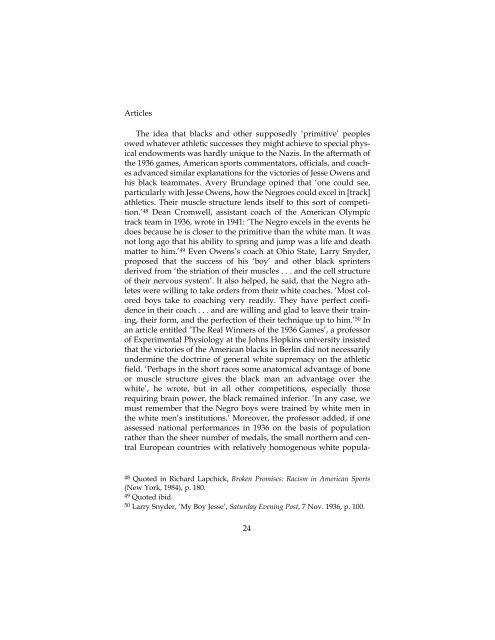Download - German Historical Institute London
Download - German Historical Institute London
Download - German Historical Institute London
Create successful ePaper yourself
Turn your PDF publications into a flip-book with our unique Google optimized e-Paper software.
Articles<br />
The idea that blacks and other supposedly ‘primitive’ peoples<br />
owed whatever athletic successes they might achieve to special physical<br />
endowments was hardly unique to the Nazis. In the aftermath of<br />
the 1936 games, American sports commentators, officials, and coaches<br />
advanced similar explanations for the victories of Jesse Owens and<br />
his black teammates. Avery Brundage opined that ‘one could see,<br />
particularly with Jesse Owens, how the Negroes could excel in [track]<br />
athletics. Their muscle structure lends itself to this sort of competition.’<br />
48 Dean Cromwell, assistant coach of the American Olympic<br />
track team in 1936, wrote in 1941: ‘The Negro excels in the events he<br />
does because he is closer to the primitive than the white man. It was<br />
not long ago that his ability to spring and jump was a life and death<br />
matter to him.’ 49 Even Owens’s coach at Ohio State, Larry Snyder,<br />
proposed that the success of his ‘boy’ and other black sprinters<br />
derived from ‘the striation of their muscles . . . and the cell structure<br />
of their nervous system’. It also helped, he said, that the Negro athletes<br />
were willing to take orders from their white coaches. ‘Most colored<br />
boys take to coaching very readily. They have perfect confidence<br />
in their coach . . . and are willing and glad to leave their training,<br />
their form, and the perfection of their technique up to him.’ 50 In<br />
an article entitled ‘The Real Winners of the 1936 Games’, a professor<br />
of Experimental Physiology at the Johns Hopkins university insisted<br />
that the victories of the American blacks in Berlin did not necessarily<br />
undermine the doctrine of general white supremacy on the athletic<br />
field. ‘Perhaps in the short races some anatomical advantage of bone<br />
or muscle structure gives the black man an advantage over the<br />
white’, he wrote, but in all other competitions, especially those<br />
requiring brain power, the black remained inferior. ‘In any case, we<br />
must remember that the Negro boys were trained by white men in<br />
the white men’s institutions.’ Moreover, the professor added, if one<br />
assessed national performances in 1936 on the basis of population<br />
rather than the sheer number of medals, the small northern and central<br />
European countries with relatively homogenous white popula-<br />
48 Quoted in Richard Lapchick, Broken Promises: Racism in American Sports<br />
(New York, 1984), p. 180.<br />
49 Quoted ibid.<br />
50 Larry Snyder, ‘My Boy Jesse’, Saturday Evening Post, 7 Nov. 1936, p. 100.<br />
24













